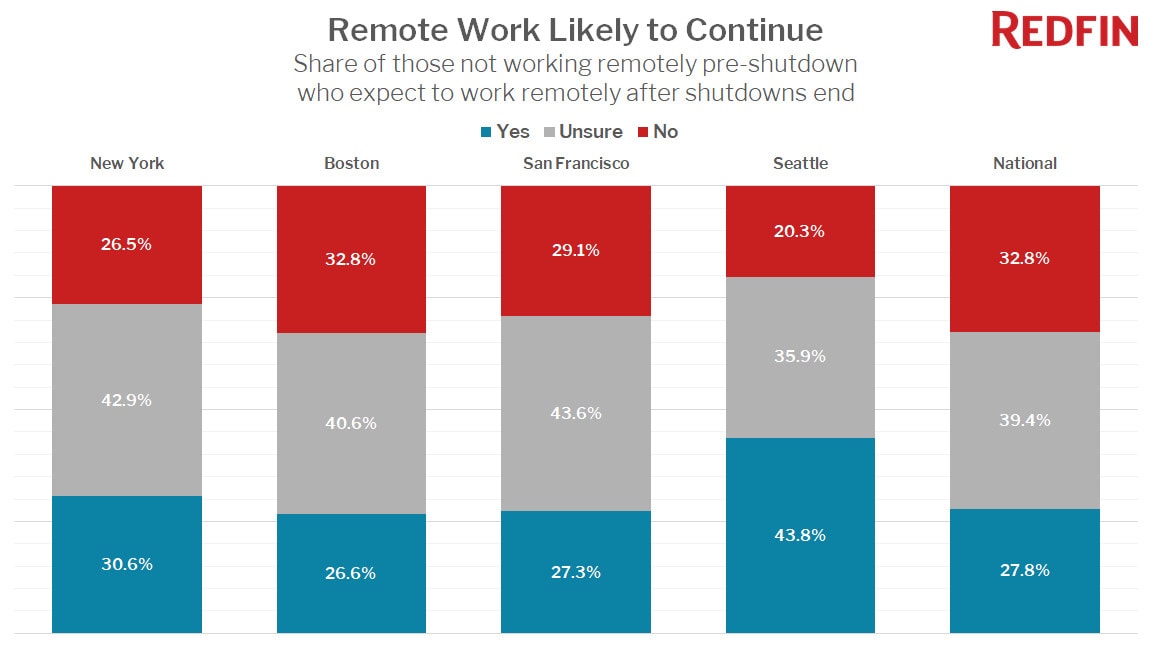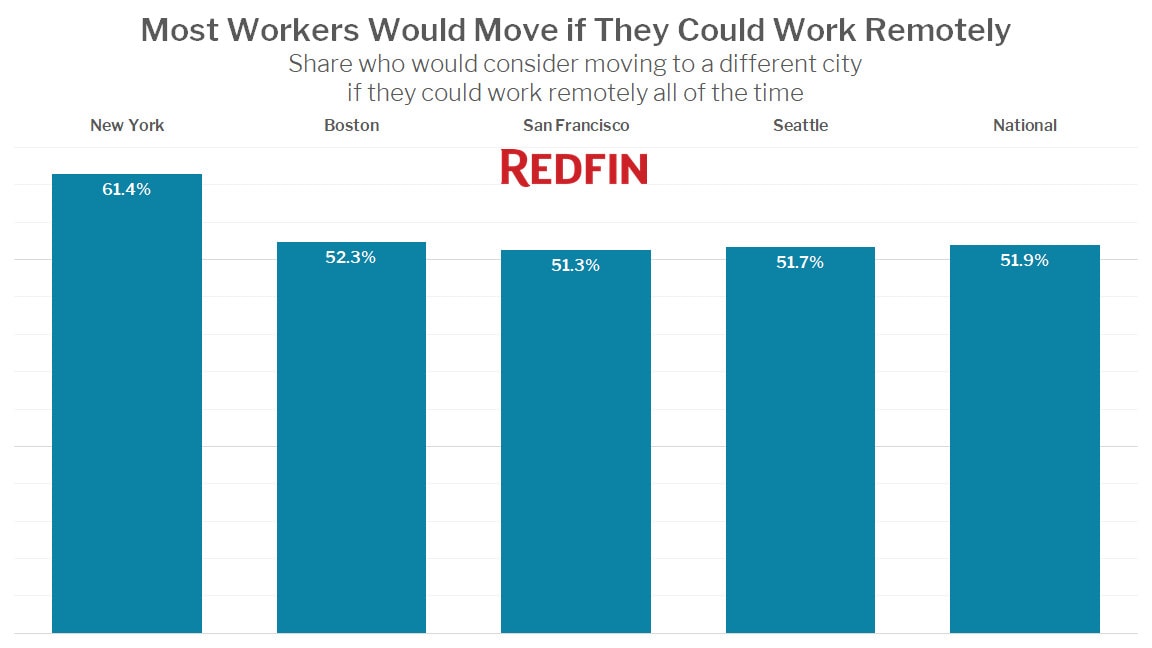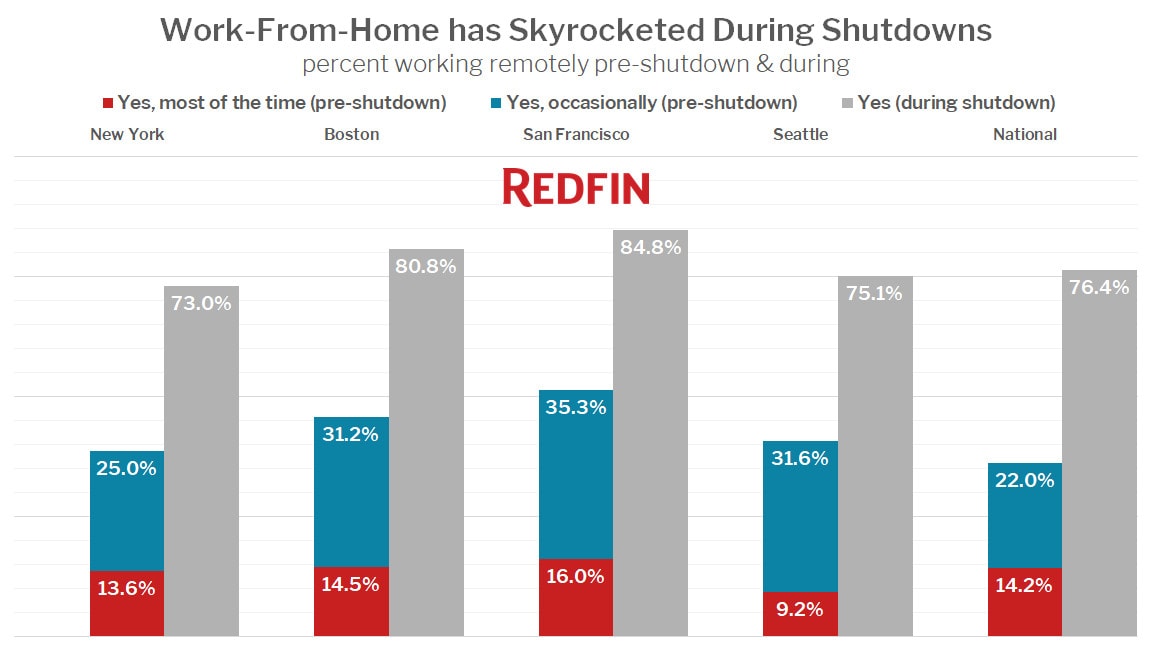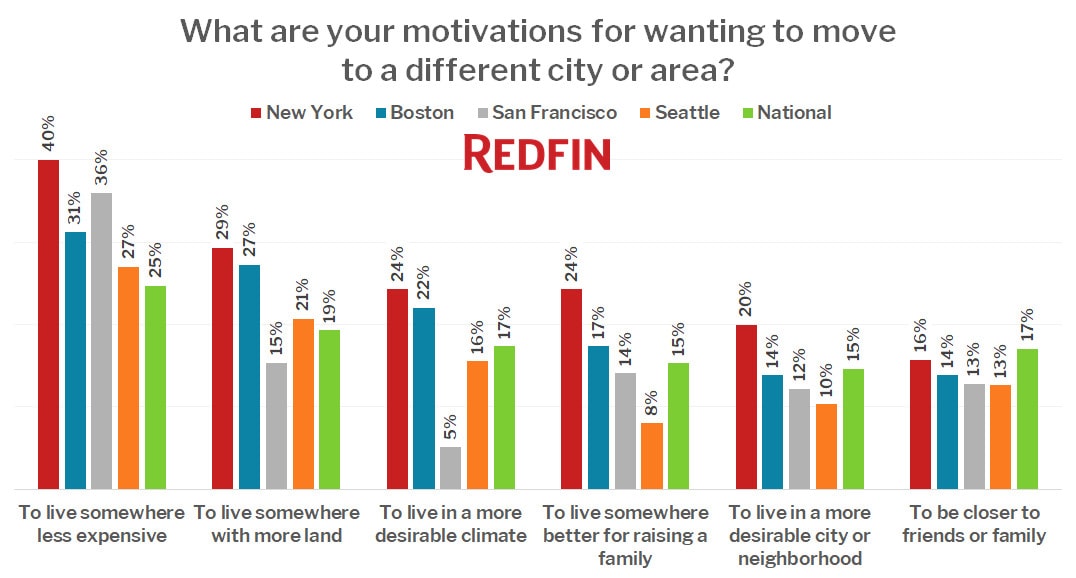Survey shows more than 50% of people in New York, Seattle, San Francisco and Boston would move if work-from-home became permanent.
The sudden shift to remote work, brought on by the coronavirus shutdowns will accelerate a major migration away from expensive coastal cities. According to a new survey of homebuyers and sellers from Redfin, 1 in 4 newly-remote workers expect to continue to work remotely once shutdowns end, and over half of respondents would move if they never had to go into an office.
“Redfin is preparing for a seismic demographic shift toward smaller cities,” said Redfin CEO Glenn Kelman. “Prior to this pandemic, the housing affordability crisis was already driving people from large cities to small. Now, more permissive policies around remote work, and a rising wariness about close quarters, will likely accelerate that trend. We expect to see more people commuting once a week from Sacramento to San Francisco, from Tacoma to Seattle, from New Hampshire to Boston. Some won’t commute at all, choosing instead to work completely virtually from a small town, perhaps where their parents still live. The whole narrative of the past 200 years, of the young person moving to the big city, may turn a little upside down in the years ahead.”
About 4 in 10 survey respondents were not working remotely before the shutdowns but were able to during the shutdowns, and more than 28% of them said that they expect to continue to work remotely or have the option to work from home after the shutdown ends. In Seattle, 44% expect to work remotely indefinitely—by far the highest of any of the high-cost cities surveyed.
Even as the pandemic has yet to fully pass the corporate trend to extend remote work options has already begun. Just last week, Twitter announced that some employees would be allowed to work from home permanently, a move that many other major tech companies are expected to make in the coming months as well.

This sudden increase in remote work may lead to an exodus from expensive coastal cities with people moving to entirely new cities or even just relocating farther out, but within the same metro area. More than 60% of survey respondents from the New York City metro area said that they would consider moving away if they were able to work remotely all of the time. In Boston, San Francisco and Seattle the share that would move away was more than 50%.

In addition to survey anecdotes, Redfin data shows that in April, 36% of Redfin.com users in the New York area were searching for homes in other cities. In San Francisco, the share looking elsewhere was 22%, followed by 13% in Seattle and 12% in Boston.
Even if remote work becomes only a part-time option, workers could still relocate to far-flung reaches of their existing metro areas to purchase a much larger home for the same price, while keeping their total weekly commute time steady. For example, price per square foot in the Seattle area falls from $327 within a 30-minute round-trip commute of downtown to $120 for a 75-minute commute. A commuter coming into the office two days a week would then still only be commuting for a total of 150 minutes per week.
Before the coronavirus shutdowns, only about 9 to 16% of survey respondents were working remotely or from home most of the time. During the shutdowns, the share working from home shot up to between 73% and 85%, with the San Francisco Bay Area leading the way at 85%.

The primary reason cited by people in New York, San Francisco, Boston and Seattle for wanting to leave: To live somewhere less expensive. New York had the largest share—40%—of people looking for relief from high costs, with San Francisco in close second at 36%.

If these trends hold up after the pandemic ends and people begin leaving high-cost coastal cities for more affordable places, we expect price-pressure to ease and gentrification to slow. One of the most lasting impacts of this pandemic will be the way it spreads a once-centralized tech workforce across the country like so many dandelion seeds in the wind.
Methodology
Redfin surveyed more than 900 currently-employed active Redfin users and customers across the country between May 3 and May 5, 2020, specifically targeting four expensive coastal metro areas: New York, Boston, San Francisco and Seattle, which accounted for 71% of the total survey responses. The remaining 29% of responses came from the rest of the country. To compile the national numbers, survey responses were weighted by population to avoid the four focus metro areas skewing the overall national number. All survey respondents were asked about their work-from-home status before, during, and after the coronavirus shutdowns, and their preference for moving to a different city or area.
For more information about the survey and its findings, contact press@redfin.com.
The post Post-Pandemic Migration from Expensive Cities Likely As 1 in 4 Newly Remote Employees Expect Work-From-Home to Continue appeared first on Redfin | Real Estate Tips for Home Buying, Selling & More.
